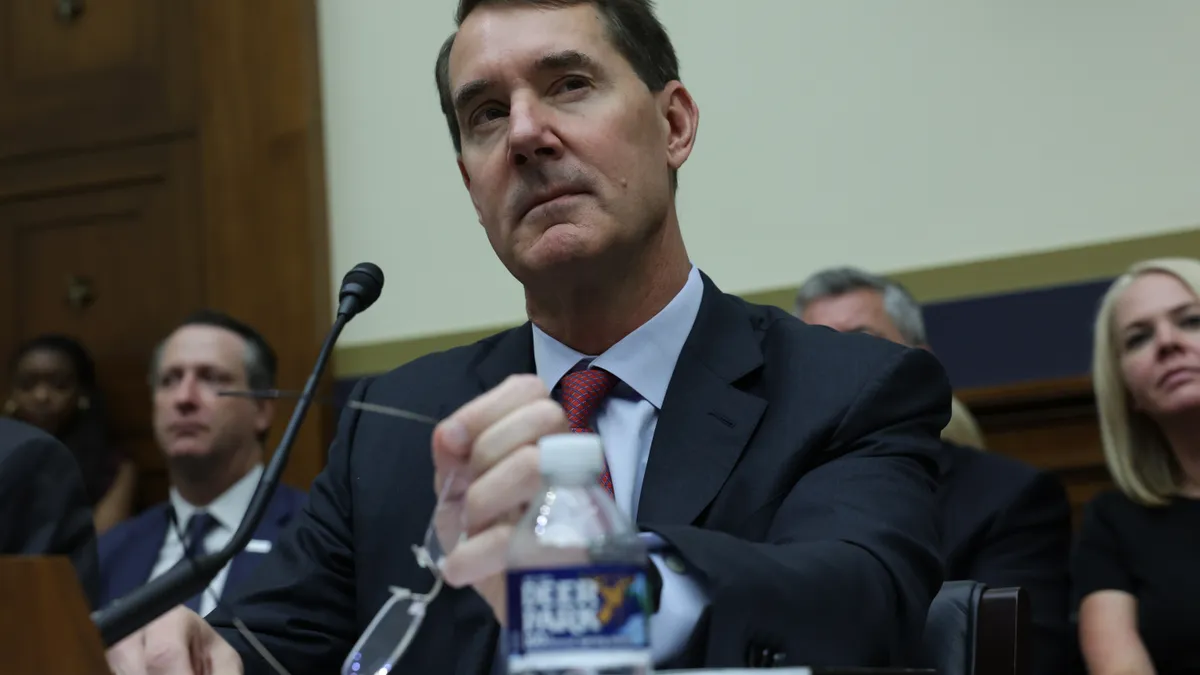At an already understaffed Federal Deposit Insurance Corp., a federal hiring freeze and an anticipated brain drain may complicate the change in direction Acting Chair Travis Hill looks to oversee at the agency.
Even more crucially, bank examinations and resolutions of failed lenders could be negatively affected by those factors, lawyers and FDIC veterans said.
A few weeks into a second Trump administration that’s taken aim at federal spending, some 20,000 federal workers have accepted “buyout” offers, Bloomberg reported Tuesday. As the deadline to accept looms, the administration has pressured federal employees and warned that furloughs or layoffs may follow, The Associated Press reported Thursday.
The FDIC has also rescinded job offers for more than 200 bank examiners as part of a federal hiring freeze, The Washington Post reported last month. The FDIC didn’t immediately respond to a request for comment.
Around 30% of the FDIC workforce is retirement-eligible, according to Michele Alt, co-founder and partner at financial services advisory and investing firm Klaros Group, and she expects the other federal banking agencies have similar shares of retirement-eligible workers.
Agency staff “found it taxing to work in Trump 1.0,” and some indicated they weren’t likely to work for a second Trump administration, Alt said. “I think we’re going to see a brain drain and a loss of institutional memory,” which will negatively impact agency function and regulation, she said.
Complicating that: the FDIC was already short-staffed, as documented in the agency’s evaluation of the Signature Bank failure. In some cases, the report noted, the FDIC – which has about 5,700 employees – was forced to lean on temporary staff who lacked the knowledge and experience needed to examine larger banks.
Insufficient staffing at the FDIC “puts our ability to handle failures – so that people have access to their money immediately – at great risk,” said Aaron Klein, a senior fellow at the Brookings Institution, during a Senate Banking Committee hearing Wednesday.
There are other industry consequences, too, Klein noted. “People talk about the need to create new banks. New banks have to be approved … and you need people there to approve the charter,” he said. “You need people to update your models, you need people to collect and promote data and information. There’s a whole host of things that could be slowed down by simply being unstaffed.”
Persistent staffing challenges may also affect the FDIC’s ability to sufficiently track risks, agency veterans said.
Bank examiners go through “a rigorous and continuous training process,” Alexandra Steinberg Barrage, a partner at law firm Troutman Pepper Locke and former FDIC executive, said in an email. Cultivated over time, their expertise is guided by senior examiners with decades of training and experience under their belts, she said.
“Losing the pipeline of young talent coupled with an exodus of the most highly experienced retirement-eligible senior examiners poses an even greater challenge to the FDIC’s ability to meet its mission,” Steinberg Barrage said. “It hampers the ability of supervisors to ensure banks remain safe and sound, and also the ability to identify and address risks early enough to mitigate the risk of bank failure.”
The FDIC is also grappling with toxic culture issues. A report released last year revealed the agency has fostered a workplace rife with sexual harassment, discrimination and other bad behavior for years. That only adds to FDIC hiring challenges, said Grant Butler, a Boston-based partner at law firm K&L Gates.
“You can’t hire new examiners in, you have older, more experienced examiners retiring, and you were already understaffed,” Butler said. “It’s a tough spot to be in, from an agency management perspective.”
To that end, Hill could have trouble implementing change at the agency. The acting FDIC chair has laid out a “super ambitious” list of priorities, including increasing transparency in bank-fintech partnerships and speeding up the bank merger approval process, but the hiring freeze “really puts pressure on even achieving some of these initiatives,” Butler said.
Hill has also advocated for a shift in bank supervision, moving away from a check-the-box exercise to zero in on core financial risks, Butler noted. “An inexperienced examiner can definitely work through a checklist well,” Butler said. “To not just check the box requires a little bit of knowledge and experience.”
If the FDIC seeks to retrain staff, or undertakes a review of how it conducts supervision, “we’re going to have a potentially understaffed agency trying to recalibrate how it examines banks,” Butler said.
In the past, when the FDIC couldn’t hire to sufficiently make up for the loss of experienced staffers, recently retired workers were brought back on a temporary or term basis, so the agency may look to do that again, said John Popeo, a partner at advisory firm The Gallatin Group and FDIC veteran.
The banking agencies “are pretty dynamic and flexible when they have to be,” he said.
Attrition or reductions-in-force at the agency tend to be cyclical: When credit is rapidly expanding, the FDIC may bolster staff in supervision and regulation; during times of crisis, the agency may add more staffers that handle resolutions, Popeo said.
Layoffs can also coincide with political party power shifts. The Trump administration has come in sharply focused on slashing government spending, but the president’s team may be trying to go beyond replacing the heads of agencies in the interest of driving change more quickly.
Ron Shevlin, managing director and chief research officer at Cornerstone Advisors, pointed to Treasury Secretary Scott Bessent taking the helm of the Consumer Financial Protection Bureau and immediately freezing bureau work this week, which the Trump administration didn’t do during his first term.
“I think Trump learned the lesson from 2016, that you can cut off the heads of the various agencies, but as long as the people who’ve been working in these agencies are still the arms and legs, they’re still going to run around and do what they’ve always done,” Shevlin said.






















